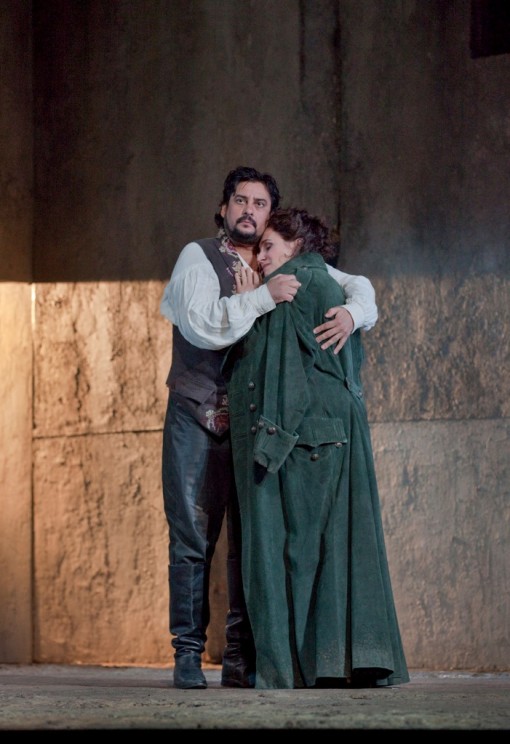A violent “Trovatore” let down by uneven vocalism

Patricia Racette and Marcelo Álvarez in the Metropolitan Opera's "Il Trovatore." Photo: Ken Howard/Metropolitan Opera.
Until two years ago the Metropolitan Opera seemed to labor under a curse when it came to productions of Verdi’s Il Trovatore. Three productions dating back to 1969 were, by popular consent, found wanting in one or more respects, the most recent of which, new in 2000, lasted just two seasons.
A repertory staple deserves better. And fortune took a turn for the better with David McVicar’s staging, which returned to the Met on Tuesday evening for its second season. The tone is set by a mural based on a painting from Goya’s “black” period depicting horrified faces, which one sees in lieu of the gold curtain upon entering the auditorium. Once the opera is underway, Charles Edwards’ sets, consisting primarily of a rotating fortress-like wall in various states of decay, suggest a country torn by strife, the action having been updated to the Napoleonic wars; the place remains Spain.
This is an unusually violent Trovatore. Stressed-out soldiers pick fights with each other. The troubadour Manrico slashes the face of the Count di Luna, his rival for the love of Leonora. A couple of gypsies go at it with knives during the Anvil Chorus. And those anvils! What a wonderful racket they make in this production.
If only the singing had been better. The evening began with an announcement that Patricia Racette, the Leonora, was suffering from a cold but would sing anyway. After such an announcement, singers sometimes seem to sound better than ever, but this was not one of those times. Racette produced something less than her usual, tonally focused sound, especially early on. Fine professional that she is, she went on to give a committed performance with no serious blemishes. But even in the best of circumstances, her voice needs more fat on it if it is to do justice to Verdi’s melodies. The sound tended to turn wiry where one wanted fullness of tone.
Marcelo Álvarez did better as Manrico. The voice has a degree of ring to it and plenty of amplitude, though there were times when it sounded worn, the inevitable result, one would think, of wielding it in so forceful a manner. The tenor brings more energy than finesse to the music, but then Manrico is a very energetic figure.
At her best Marianne Cornetti, as Manrico’s putative mother Azucena, makes an appealing sound–and a large one–that carries in the vast house. But, especially in mid-range, there was a lack of precision and steadiness to her singing that made pitches indistinct. Nor did her acting do much to invest the colorful gypsy–a role Verdi was especially proud of–with dramatic life.
Željko Lučić contributed a solid Count di Luna, if a rather stodgy one. His Il balen needs more poetry if it is to convince one that the Count loves Leonora at least as much as Manrico does. The Ukrainian bass Alexander Tsymbalyuk, in his Met debut as Ferrando, displayed a voice of unmistakably Slavonic provenance in its size and rugged timbre. In another debut Renée Tatum, as Leonora’s confidante Inez, held her own handsomely in exchanges with her mistress.
The conductor Marco Armiliato collaborated ably with the singers while insuring that the hot-tempered score unfolded with ample dynamism.
Il Trovatore runs thru Nov 19, then returns in April (with a new cast) April 20-30. metoperafamily.org.